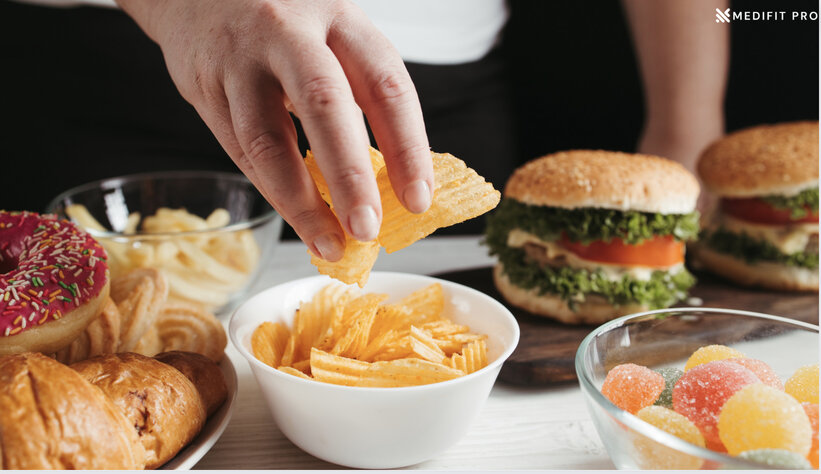Are you guilty of indulging in a heaping plate of pasta, an extra slice of pizza, or an entire bag of chips? We’ve all been there. Overeating is a common problem that affects many people, especially in today’s world of convenience foods and fast-paced lifestyles. However, the consequences of overeating can be dire, with health issues like heart disease, diabetes, and obesity on the rise.
So, what exactly is overeating? Simply put, it’s consuming more food than your body needs, often leading to negative health consequences. Overeating can be caused by a variety of factors, including stress, boredom, and emotional eating. But the good news is that there are effective strategies to help you control overeating habits and maintain a healthy body and mind.
In this article, we’ll dive into these strategies, from mindful eating to portion control. We’ll also explore the impact of overeating on health and why it’s important to develop healthy eating habits. So, buckle up and get ready to learn how to curb your cravings and control your eating habits once and for all!
II. Understanding Overeating
Have you ever found yourself mindlessly snacking in front of the TV or reaching for another cookie when you’re already full? These are common signs of overeating, but what exactly causes this behavior?
A variety of factors can contribute to overeating, including:
• Stress: When you’re under stress, your body releases cortisol, a hormone that can increase your appetite and lead to overeating. To know about strategies to beat stress, read How to cope with stress
• Boredom: Eating can be a way to pass the time, especially when you’re feeling bored or restless.
• Socialising: Sharing a meal with friends or family can be a fun and enjoyable experience, but it can also lead to overeating if you’re not mindful of your portions.
• Availability of food: When food is easily accessible, it can be tempting to indulge, even if you’re not hungry.
• Emotional eating: Emotional eating is another common trigger for overeating. This is when you turn to food to cope with emotions such as stress, anxiety, or sadness
Emotional eating is a common phenomenon that affects many people, especially during times of stress or anxiety. It’s the act of turning to food to cope with emotions, rather than eating because you’re physically hungry.
Emotional eating can be triggered by a variety of emotions, such as stress, boredom, loneliness, or sadness. When you’re feeling overwhelmed or upset, it can be tempting to turn to comfort foods like ice cream, pizza, or chocolate for relief.
Unfortunately, emotional eating can create a cycle of guilt and shame, leading to more overeating. It can also lead to weight gain and other health problems, as many comfort foods are high in calories, sugar, and fat.
The good news is that there are effective strategies to help you break the cycle of emotional eating and control overeating habits.
III. Strategies to Control Overeating
A. Mindful Eating
Mindful eating is a powerful tool for controlling overeating and developing healthy eating habits. It involves paying attention to the present moment, being aware of your thoughts and feelings, and noticing the sensations of eating.
Here are some benefits of mindful eating:
1. Improved digestion: When you’re more aware of what you’re eating, you’re more likely to chew your food thoroughly, which aids in digestion.
2. Better portion control: Mindful eating helps you become more in tune with your body’s hunger signals, so you’re less likely to overeat.
3. Enhanced enjoyment of food: When you take the time to savor each bite, you can fully appreciate the flavors and textures of your food.
So how can you practice mindful eating? Here are a few techniques to try:
1. Slow down: Take your time with each bite and chew slowly. Put down your utensils between bites and take a few deep breaths.
2. Pay attention to your senses: Notice the flavors, textures, and smells of your food. Pay attention to how your body feels before, during, and after eating.
3. Eliminate distractions: Turn off the TV, put away your phone, and focus solely on the act of eating.
4. Listen to your body: Check in with yourself periodically to see if you’re still hungry. If you’re feeling full, stop eating even if there’s still food on your plate.
By practicing mindful eating, you can develop a healthier relationship with food and reduce overeating habits.
B. Plan your Meals
Meal planning is an effective strategy for controlling overeating and developing healthy eating habits. It involves pre-planning your meals for the week, which can help you make healthier choices and avoid impulsive eating.
Here are some benefits of meal planning:
1. Saves time and money: By planning ahead, you can save time and money by shopping for groceries in bulk and avoiding last-minute takeout meals.
2. Reduces food waste: When you plan your meals, you’re less likely to buy excess food that goes to waste.
3. Encourages healthy choices: Meal planning allows you to make intentional choices about the foods you eat, making it easier to maintain a balanced and nutritious diet.
So how can you plan healthy meals? Here are a few tips to try:
1. Start with a grocery list: Before you go shopping, make a list of the ingredients you’ll need for your meals. This will help you stay on track and avoid buying unnecessary items.
2. Focus on whole foods: Incorporate a variety of whole foods like fruits, vegetables, whole grains, and lean proteins into your meals.
3. Use a meal planning template: Consider using a meal planning template or app to help you organize your meals for the week.
4. Prep ahead of time: Take some time on the weekends to prep ingredients or cook meals ahead of time, so you have healthy options readily available during the week.
By planning your meals ahead of time, you can make healthier choices and reduce the temptation to overeat.
C. Portion Control
Portion control is a critical strategy for controlling overeating habits and maintaining a healthy weight. When you eat larger portions than your body needs, you’re more likely to consume excess calories, leading to weight gain and other health problems.
Here are some benefits of portion control:
1. Helps with weight management: By controlling your portion sizes, you can manage your weight and reduce the risk of obesity and other health problems.
2. Increases mindfulness: Being aware of your portion sizes helps you become more mindful of what you’re eating and how much you’re consuming.
3. Reduces food waste: By controlling your portion sizes, you can reduce the amount of food waste and save money on groceries.
Here are some tricks for managing portion sizes:
1. Use smaller plates: Using smaller plates can make it look like you’re eating more, even if you’re eating less.
2. Measure your food: Use measuring cups or a food scale to measure out appropriate portions for your meals.
3. Eat slowly: Eating slowly allows your body to register when it’s full, reducing the chances of overeating.
4. Divide your plate: Divide your plate into sections for protein, complex carbohydrates, and vegetables to ensure that you’re getting a balanced meal.
By practicing portion control, you can develop healthy eating habits and reduce the likelihood of overeating.
D. Avoid Skipping Meals
Skipping meals may seem like an easy way to reduce calorie intake and lose weight, but it can actually have negative effects on your health and lead to overeating habits.
Here are some dangers of skipping meals:
1. Slows metabolism: When you skip meals, your body goes into survival mode and slows down your metabolism to conserve energy, making it harder to lose weight.
2. Increases hunger: Skipping meals increases feelings of hunger, making you more likely to overeat later in the day.
3. Lowers blood sugar: Skipping meals can cause a drop in blood sugar levels, leading to fatigue, irritability, and difficulty concentrating.
Here are some reasons why eating regular meals and snacks is important:
1. Maintains energy levels: Eating regular meals and snacks helps to maintain steady blood sugar levels and keep your energy levels up throughout the day.
2. Reduces cravings: Eating regular meals and snacks can help to reduce cravings for unhealthy foods, making it easier to stick to healthy eating habits.
3. Prevents overeating: When you eat regular meals and snacks, you’re less likely to feel overly hungry and overeat at your next meal.
To avoid overeating habits, it’s essential to eat regular meals and snacks throughout the day. Aim for three meals and two to three snacks per day, spaced evenly throughout the day to maintain steady blood sugar levels and reduce the likelihood of overeating.
E. Use Smaller Plates and Bowls
Using smaller plates and bowls is a simple yet effective strategy for controlling portions and reducing overeating habits.
Here are some ways smaller plates and bowls can help control portions:
1. Trick your brain: Using smaller plates and bowls can trick your brain into thinking you’re eating more than you actually are, making you feel more satisfied with smaller portions.
2. Portion control: Smaller plates and bowls help to control portion sizes by limiting the amount of food you can fit on them.
3. Mindful eating: Using smaller plates and bowls can help you practice mindful eating by paying closer attention to the amount of food you’re consuming.
Here’s the psychology behind using smaller plates:
1. Delboeuf illusion: The Delboeuf illusion suggests that people perceive a smaller circle surrounded by a larger circle as being larger than an identical-sized circle surrounded by a smaller circle. This illusion applies to the size of plates and bowls, where a smaller plate or bowl can make you perceive your food portion as larger.
2. Plate size norms: People often use the size of plates and bowls as a cue for how much food to eat. Using a smaller plate or bowl can help to reset your perception of how much food is appropriate to consume.
Using smaller plates and bowls is a simple and effective way to reduce overeating habits and maintain a healthy weight. Consider replacing your large plates and bowls with smaller ones to help control your portions and practice mindful eating.
F. Drink Water
Drinking water is a simple yet powerful strategy for controlling overeating habits and promoting weight loss.
Here are some benefits of drinking water before and during meals:
1. Reduces appetite: Drinking water before meals can help to reduce appetite and make you feel fuller, leading to consuming fewer calories during the meal.
2. Hydration: Drinking water during meals helps to keep you hydrated and aids in digestion, making you feel more satisfied with smaller portions.
3. No calories: Unlike sugary drinks, water has no calories and helps to reduce overall calorie intake. Also read How to stay Hydrated
Here’s how drinking water can help control hunger:
- Thirst vs. hunger: Often, we mistake thirst for hunger and end up overeating. Drinking water can help to quench thirst and reduce the urge to eat unnecessarily.
- Dehydration and hunger: Dehydration can lead to feelings of hunger and overeating habits. Drinking water helps to keep you hydrated, reducing feelings of hunger.
To control overeating habits, it’s essential to stay hydrated by drinking water regularly. Aim to drink at least 8-10 glasses of water per day, and try to drink a glass of water before and during meals to control your appetite and promote healthy eating habits.
G. Get Enough Sleep
Getting enough sleep is a critical strategy for controlling overeating habits and maintaining a healthy weight.
Here’s the relationship between sleep and overeating:
1. Hormones: Lack of sleep disrupts the hormones that regulate appetite, leading to increased feelings of hunger and overeating habits.
2. Cravings: Sleep deprivation also increases cravings for high-calorie, high-fat, and sugary foods, leading to overeating and weight gain.
Also read Sweet Dreams: Tips to improve your sleep
Here are some tips for getting enough sleep to reduce overeating:
1. Create a sleep routine: Establish a regular sleep routine by going to bed and waking up at the same time every day. Also read
2. Avoid screens: Avoid using electronic devices such as smartphones, tablets, and computers before bedtime as they can disrupt sleep patterns.
3. Create a comfortable sleep environment: Make sure your sleep environment is comfortable, cool, and dark to promote restful sleep.
4. Avoid caffeine and alcohol: Caffeine and alcohol can disrupt sleep patterns, leading to insufficient sleep and overeating habits.
5. Exercise regularly: Regular exercise can help to promote restful sleep and reduce stress, leading to better control overeating habits. Also read How to Stay Motivated for Exercise
IV. Conclusion
By getting enough sleep, you can regulate your appetite hormones, reduce cravings, and maintain healthy eating habits. Aim to get at least 7-9 hours of sleep every night, and try to establish a regular sleep routine and a comfortable sleep environment to promote restful sleep.
In conclusion, overeating can have negative impacts on our health and well-being. However, with the right strategies and habits, it is possible to control overeating and maintain a healthy weight. Here’s a recap of the strategies we discussed:
• Mindful eating
• Meal planning
• Portion control
• Avoiding skipping meals
• Using smaller plates and bowls
• Drinking water
• Getting enough sleep
By practicing these strategies consistently, we can develop healthy eating habits and promote long-term success in maintaining a healthy weight. It’s essential to remember that developing these habits takes time, patience, and consistency. We should be kind to ourselves and celebrate small victories along the way. Also, developing healthy eating habits is crucial for our overall health and well-being. By controlling overeating habits and maintaining a healthy weight, we can improve our quality of life, reduce the risk of chronic diseases, and feel better physically and mentally. Let’s start by implementing these strategies and making healthy choices every day.
If you want to calculate your caloric requirement, use our calorie calculator
Reference
The American Dietetic Association: https://www.eatright.org/



























Recent Comments